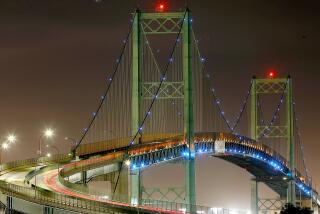Car-Pool, Toll Lanes Coming to Wider Riverside Freeway : Transportation: Work to start May 17 on $346-million revamping of road to Inland Empire that could turn it from overcrowded corridor into a state-of-the-art throughway.
ANAHEIM — Overflowing with traffic, the Riverside Freeway--Orange County’s northeast passage to the Inland Empire--is about to be widened to accommodate car pools and California’s first entrepreneur-owned toll lanes.
On May 17, construction crews will start adding one car-pool lane in each direction to an initial 2.5-mile, $13.6-million segment, the first step in a massive, $346-million plan to make the freeway state of the art from the Riverside County border to Los Angeles County.
Traffic congestion is so bad that many commuters leave their homes by 4 a.m. in Riverside and San Bernardino counties in order to make it to work on time.
The Riverside Freeway is a “parking lot for a good part of the commute hours,” said Monte Ward, the Orange County Transportation Authority’s director of external affairs. “By far, for the northern part of Orange County, this is the most important part of the Measure M program.”
The first section, between the Orange and Costa Mesa freeways, will be paid for with Measure M sales tax revenue.
By fall, groundbreaking is also expected on two toll lanes in each direction on another stretch of the freeway. Expected to cost users $1.50 to $2 each way, the toll lanes will extend 10 miles west from the Riverside County border and connect to the new car-pool lanes where the Riverside and Costa Mesa freeways come together.
The freeway now varies in width from eight to 10 lanes, with a now-vacant median strip that ranges in width from 60 to 200 feet.
The toll lanes will occupy the median strip and will be operated by Irvine-based California Private Transportation Corp., which was awarded an exclusive contract from Caltrans three years ago. The firm estimates that its portion of the freeway project will cost up to $120 million, and it has an option to purchase the car-pool lanes west of the Costa Mesa Freeway--the stretch being built with Measure M dollars--before the lanes open to traffic.
An automatic vehicle identification tag that motorists will be able to purchase for about $30 will exchange radio signals with an overhead scanner so that tolls can be electronically billed to an individual or corporate account set up in advance. This will avoid backups at toll booths.
If bumper-to-bumper snarls spread to the toll lanes, officials can ratchet up the fees to levels that will persuade some potential customers to stay away. Electronic message signs will be equipped to warn motorists of tolls as high as $9.99 in the nation’s first-ever test of so-called congestion pricing, a traffic management strategy touted by free-market enthusiasts and used in Singapore.
The toll lanes will be free to cars and buses carrying three or more instead of the two or more standard on existing car-pool lanes elsewhere.
Caltrans, the California Private Transportation Corp. and OCTA are hoping that the toll lanes will be completed at the same time as the new car-pool lanes--in about three years--so that traffic from one segment can flow smoothly into the other.
Awarded an exclusive toll-lane contract three years ago, the private firm had hoped to participate in joint groundbreaking ceremonies on May 17, but delays in completing investor financing of the toll lanes have persuaded OCTA not to wait any longer to begin construction.
As part of Orange County’s effort, now-snarled interchanges also will be rebuilt with special car-pool ramps that will enable cars using these lanes to switch freeways almost effortlessly with no change of lanes.
On the Riverside County side of the border, car-pool lanes are already under construction, with some sections already open to traffic, paid for by a Riverside County sales tax.
And by the end of the decade, the new Orange County car-pool lanes will connect with existing car-pool lanes on the Artesia Freeway in Los Angeles County, providing a continuous link between Riverside and Carson.
All existing lanes will remain open during daytime construction, with some lane closures at night.
Not everyone is convinced that installation of the car-pool and toll lanes will provide significant benefits to commuters.
“I don’t believe it will work,” said Steve Marshall, manager of California Desktop Publishing Co., a small firm on Kraemer Boulevard near the freeway in Anaheim. “Most people don’t use car-pool lanes. I look at the number of people who are in car-pool lanes and how many are not. And if people are going to be paying fees, that will just drive people away. It’s stupid.”
It’s not as if Marshall is unconcerned.
A resident of Orange County for 20 years, Marshall said he’s so fed up with traffic congestion that he’s planning to leave. “I’m either going to New Mexico, Alaska, Montana or Wyoming,” he said. “I haven’t decided which one.”
But Al Riviera, manager of ALS Sheet Metal, another small firm on Kraemer Boulevard, strongly supports the upcoming freeway projects.
“If you make a faster lane, I’ll pay for it, believe me,” Riviera said. “I come from Lake Elsinore every day, and it takes an hour and a half each way. It’s terrible.”
“Even if I drive alone, I’ll still use the car-pool lanes,” Riviera promised. “Even if I have to pay a ticket, it would be worth the risk.”
More to Read
Sign up for Essential California
The most important California stories and recommendations in your inbox every morning.
You may occasionally receive promotional content from the Los Angeles Times.










